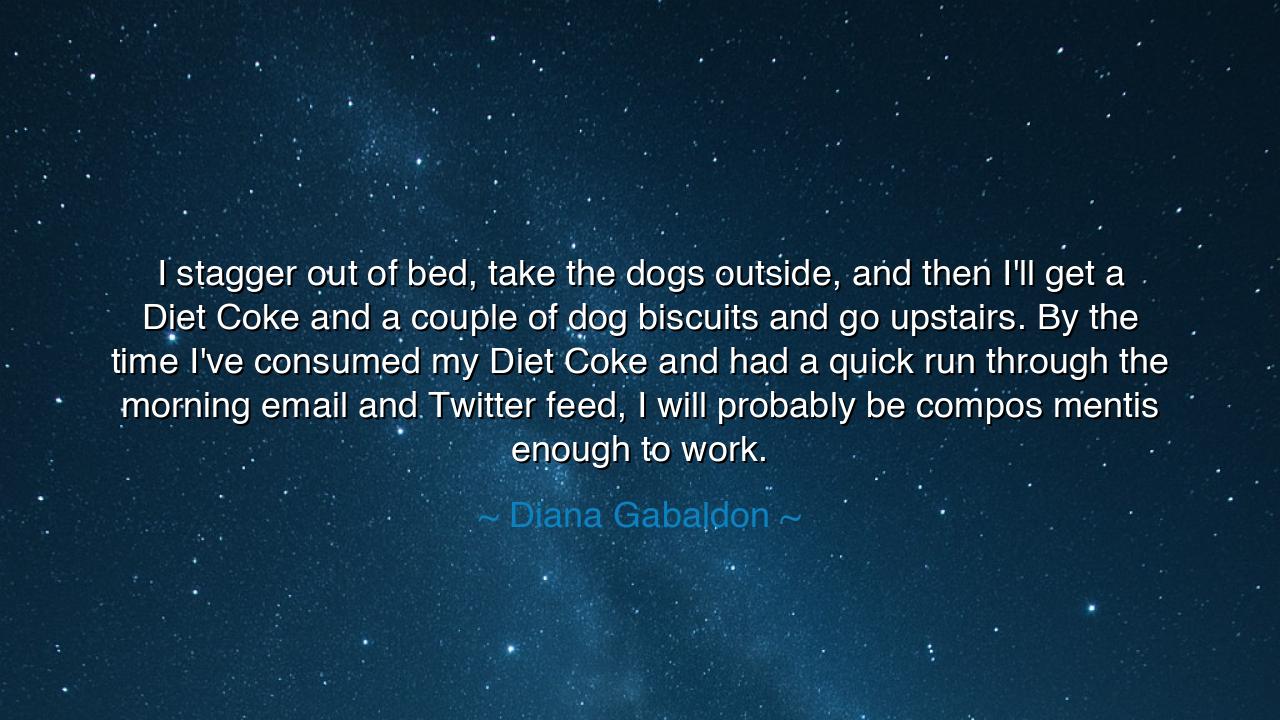
I stagger out of bed, take the dogs outside, and then I'll get a
I stagger out of bed, take the dogs outside, and then I'll get a Diet Coke and a couple of dog biscuits and go upstairs. By the time I've consumed my Diet Coke and had a quick run through the morning email and Twitter feed, I will probably be compos mentis enough to work.






In the words of Diana Gabaldon, “I stagger out of bed, take the dogs outside, and then I'll get a Diet Coke and a couple of dog biscuits and go upstairs. By the time I've consumed my Diet Coke and had a quick run through the morning email and Twitter feed, I will probably be compos mentis enough to work.” At first, these words appear ordinary—a simple glimpse into the morning ritual of a writer. Yet beneath their lighthearted humor lies a quiet truth about the rhythm of human endeavor, about the ritual of awakening, both body and mind, before the labor of creation begins. For in the smallest gestures—the sip of a drink, the walk of a dog, the humble pause before thought—resides the ancient wisdom of preparation.
The ancients, too, understood the sanctity of beginnings. Before the orator spoke, he washed his face in cool water and whispered a prayer to the muses. Before the warrior trained, he stretched his limbs beneath the rising sun, aligning body and spirit. These acts were not mere habits—they were rites of readiness, marking the threshold between rest and purpose. So too, Gabaldon’s Diet Coke, her dog biscuits, her quiet scroll through the world’s chatter—these are her offerings to the dawn, her way of coaxing her consciousness from the fog of sleep into the clear air of creation.
It is easy to mistake such words for levity, but humor often cloaks wisdom. In saying she “staggers out of bed,” Gabaldon acknowledges the truth that many deny—that the mind does not awaken instantly, and genius does not spring forth at command. Even the greatest minds must warm themselves at the fire of routine. She shows that discipline need not be austere; it can be laced with laughter, grounded in ordinary pleasures. The artist, like the philosopher, must first become compos mentis—fully present, fully human—before attempting to commune with the divine spark of inspiration.
Think of Ludwig van Beethoven, who each morning measured out sixty beans of coffee for his breakfast—no more, no less. It was his ritual, his way of anchoring thought to the world before diving into the ocean of sound. Or consider the great Charles Darwin, who walked the same path each day, circling his garden like a meditative pilgrim, until his ideas found their form. In their precision, in their small daily devotions, we see the same wisdom that Gabaldon reveals in jest: that creativity is not born in thunder, but in rhythm. Routine is the humble chisel that shapes the marble of the mind.
There is also a quiet humanity in her mention of the dogs. The dogs—simple creatures of loyalty and joy—draw her first act of the day not toward self, but toward care. This, too, is wisdom. For service grounds the spirit, softens the ego, and reminds the creator that before one shapes stories, one must tend to life itself. The wag of a tail, the shared biscuit, the crisp air of morning—all these restore the balance between art and existence. Thus, the dogs are not mere companions but guardians of rhythm, anchors of presence in a world that races toward abstraction.
And then there is the Diet Coke—a symbol not of indulgence but of the small modern comforts that tether us to the moment. The ancients had their wine, their tea, their morning libations to the gods; we, too, have our rituals of renewal. What matters is not the form, but the intention—the acknowledgment that before we rise to meet the world, we must first make peace with our own awakening. Gabaldon’s humor teaches us to treat these acts not as trivialities, but as the foundations of creative life.
So, what lesson can we draw from this modern oracle wrapped in wit? It is this: do not despise the ordinary, for the ordinary is sacred when done with awareness. Every great work begins with a moment of gathering—the slow return of spirit to form, of thought to will. Whether you are an artist, a scholar, or a dreamer, craft your morning with tenderness. Step into the day not in haste, but with reverence. Feed your dogs, sip your drink, breathe the air. And when the mind has settled, when the heart has stilled its flutter, then take up your labor.
For creation is not a race against the dawn—it is a conversation with it. As Diana Gabaldon reminds us, the path from sleep to compos mentis is a sacred journey in itself. Walk it gently, and you will find that by the time the sun fully rises, the muse is already waiting.






AAdministratorAdministrator
Welcome, honored guests. Please leave a comment, we will respond soon